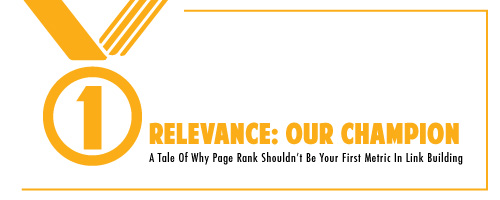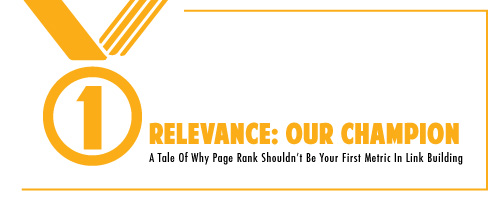Invariably, we encounter clients who think that PageRank, or Domain Authority, should be treated as the north star of link building.
True, there’s value in measuring and assessing these two metrics before chasing a link, but it certainly shouldn’t be concern numero uno.
There have been plenty of articles, posts, and even rants about why PageRank is a lousy metric to chase. And they do a remarkably great job breaking down the issues and faults with a PR centric view.
Domain Authority, the metric from Moz, is better, but still relies on the same approach – perceived authority through an algorithm. True, it updates faster, reports more detailed information, and I trust it more than the PR toolbar, but still I don’t believe it’s the metric we should be chasing.
The problem with using a PR/DA centric approach is that they overlook:
- Relevance
- Community engagement
- Traffic
- Up-and-coming sites
- Potentially beneficial relationships
- Small niche authority
- Diversity
What’s more, PR can over-inflate:
- Domain age
- Spammy tactics (unless it’s caught)
- Temporary penalties
And yet monthly we have clients requesting we use a PR/DA first approach. Client education is naturally part of the job, and since we’ve had the conversation so many times I thought I’d share our thoughts on focusing too intensely on PR or DA.
Does that mean we ignore PR/DA completely in our link building efforts? Absolutely not. But it isn’t, and shouldn’t be, the first measure of success. In fact, when we’re judging link quality here at Page One Power, the DA/PR only accounts for 15% of the overall value we assign to a link.
So, what is the first metric we judge when building links? Simple: relevance.
Relevance
Relevance is far and away the most important metric to measure when beginning a link building campaign.
Why relevance? Four reasons:
- To build future-proof, natural links
- For the betterment of mankind, and the web
- An ex-member of Google’s search quality team referred to relevance as the new PageRank
- Relevant links can actually drive traffic, whereas irrelevant links never will
But what is relevance? How can we even begin to determine whether something is ‘relevant’ to our client’s site?
Determining Relevance
Relevance is definitely hard to attach a specific value to, on a scale from 1-10. How relevant is something? How do you qualify completely relevant, mostly relevant, somewhat relevant, and irrelevant?
Relevance can be somewhat subjective, but it’s a safe bet that Google has managed to algorithmically defined it. To help make sure we’re staying as relevant as possible we look at several factors:
- Domain Relevance
- Page Relevance
- Link Relevance
Domain Relevance:
This is simply the relevance of the target domain in relation to your (or your client’s) domain. Typically we rate this on a scale from 1-3:
3 points – Completely relevant (same industry)
2 points – Closely relevant (one degree of separation)
1 point – Loosely relevant (there’s a connection, but it’s not immediate)
We never even consider going after a site we consider to be irrelevant.
Page Relevance:
To measure page relevance, we look at a variety of on-page metrics. What’s the title of the page? What’s the URL? What about the content on the page?
Again, we give a sliding 1-3 rating based upon the same concept, and we’ll never attempt to secure a link on a page that we decide is irrelevant.
Link Relevance:
Link relevance is how the link points to our website from the target website.
For example, does the link make logical sense? Is the link relevant to the content it’s surrounded by? Is the anchor text relevant to both the target page and ours? Is the placement on the target page relevant?
We don’t rate link relevance – we always make sure we’re linking in a relevant, helpful manner, or we do not pursue the link.
So, now that relevance has been defined, let’s take a look at our four reasons for pursuing relevance.
1) To build future-proof, natural links
As link builders and online marketers, we want anything we do to have lasting value. There’s real responsibility in working with clients and building links, and that responsibility requires the understanding that we’re representing another company’s business, brand, and often livelihood. This isn’t something to be taken lightly.
Therefore we should all strive to create future-proof, natural links. Links that are wholly relevant, make contextual sense, and that users actually choose to click on.
We work hard to only create relevant links on sites that make sense, linking in an intelligent manner. This helps minimize our Google footprint, ensures we’re working effectively for our client, and that everything we do provides lasting value.
And lasting value is one of the bestselling points of SEO. Creating a cumulative positive effect not just for today, tomorrow, the next month, but for years is something we as SEOs should take pride in. Very few avenues of marketing can claim such a lasting impact.
Creating relevant links is very much a part of that lasting value, guaranteed to continue to move the needle.
2) For the betterment of mankind, and the web
Google has stated over and over and over again that they want to reward those who create great user experiences. Unfortunately, SEO and link building has been tarnished with a reputation of manipulation, muddying the search results, and overall poor user experiences.
And it’s no wonder – our history is full of spammy tactics such as cloaking, article marketing, blog comment spam, and spun articles.
I can honestly say I’ve seen some links that even I was offended by. I once saw a blog comment with a link to a third party vender of military boots that was clearly spam. What made it so horribly offensive is that it was perched in the middle of an obituary, between loving comments left by friends and family of the deceased. Despicable.
Today we’re in the best spot we’ve ever been as an industry. We’re more focused than ever on creating great content, natural links, and helpful user experiences.
By continuing to focus on relevancy first, we can ensure that we continue to create experiences that users actually appreciate.
3) An ex-member of Google’s search quality team referred to relevance as the new PageRank
Although we used relevance as our guiding principle since the founding of Page One Power, it’s always nice to have confirmation.
Relevance simply makes sense when pursuing link building. That a link from a high PR site was always valuable (as it once was) never made much sense – Google was bound to learn and grow beyond such systems.
One thing we can be certain of in this uncertain industry: the continual sophistication and improvement of Google’s algorithms. Google can now ferret out relevance – or lack thereof – for even broad topic websites such as newspapers, entertainment, or even humor.
So although relevance always made common sense, and landing a relevant link from a large site like the NY Times will always be a huge win, you absolutely shouldn’t be pursuing a link simply for the DA/PR of the site.
4) Relevant links can actually drive traffic, whereas irrelevant links never will
As link builders much of what we do centers around driving meaningful traffic to our clients site. Albeit most of this traffic is a result of ranking improvements as opposed to direct traffic, the opportunity for direct traffic is certainly not something we ignore.
The best way of determining a relevant link is asking the question: “If Google didn’t exist, would I want this link?”
If the answer is yes, then odds are you’ve just created a relevant, natural link that has the potential to drive traffic.
Creating good, relevant, natural links is the only way to drive traffic directly through a link. No user is ever going to follow an irrelevant resource link from a website selling dog beds to a website selling computer supplies.
Direct traffic is an outstanding indicator of the strength of a link. If the link is driving traffic, it means:
- The website has significant enough traffic to send some your way
- The link is a natural fit for users, relevant to their needs, and they’re engaged enough to click
- The website will likely continue to improve, thus further increasing the SEO benefit of the link
There’s never a guarantee that a link will drive traffic on its own, but it’s always a great win when it does.
Recap
Relevance should be the first metric used in link building. PageRank and Domain Authority should still be considered, but only as secondary – or even tertiary – factors.
If you solely chase PR or DA, you’ll be missing out on important opportunities. The PageRank toolbar, and even Domain Authority—which is faster to update and generally more reliable—absolutely shouldn’t be the first metric in link building.
To determine relevance, look to the relevance of the domain, the target page, and the link. Pretend you’re operating in a world without Google, and you’ll be creating great links that make sense.
Why bother?
- To build future-proof, natural links
- For the betterment of mankind, and the web
- An ex-member of Google’s search quality team referred to relevance as the new PageRank
- Relevant links can actually drive traffic, whereas irrelevant links never will
Relevance should always be the first and foremost concern, and guides our link building principles at Page One Power, helping us build future-proof links that provide lasting value to our clients.
Ref: PageOnePower




